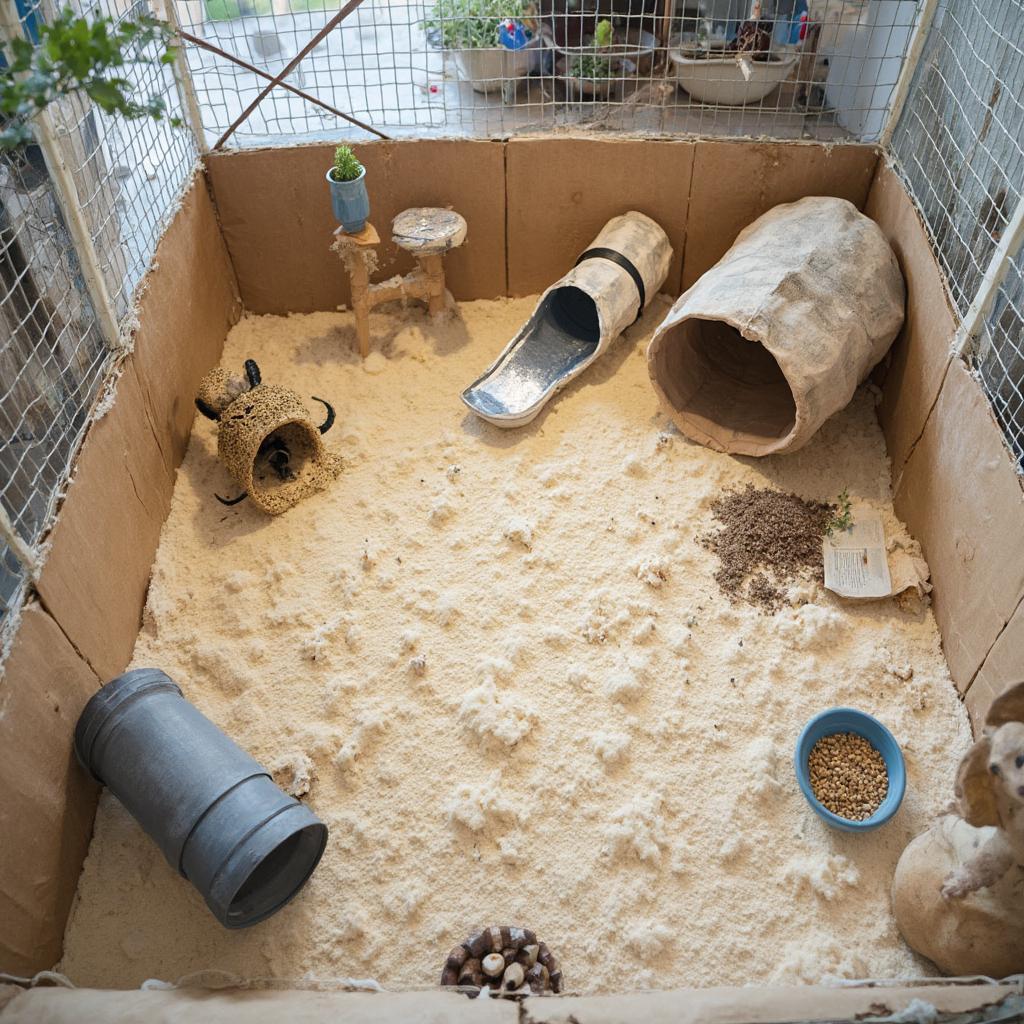Your cart is currently empty!

Essential Hedgehog Care Tips for a Happy, Healthy Pet
Hedgehog care involves specific needs that differ significantly from more common pets. Understanding these unique requirements is crucial for ensuring your prickly pal thrives. This comprehensive guide offers valuable hedgehog care tips covering everything from housing and diet to handling and health.
Creating the Perfect Hedgehog Home
Your hedgehog’s enclosure should be escape-proof, well-ventilated, and spacious enough for exploration and exercise. A solid-bottomed cage is preferred over wire or mesh, as hedgehogs’ tiny feet can get caught. Avoid using cedar or pine shavings as bedding, as they release harmful oils. Instead, opt for paper-based bedding, fleece liners, or aspen shavings. Maintain a temperature between 72-80°F to prevent hibernation, which can be dangerous for pet hedgehogs. Provide a hiding place, such as a small igloo or a fleece pouch, where your hedgehog can feel safe and secure. Enrichment items like tunnels, toys, and a wheel (solid-surface only) are essential for preventing boredom and promoting physical activity. Remember, a stimulating environment is key for happy hedgehog care. Check out these tips on taking care of a hedgehog for more information on setting up the perfect habitat.
 Ideal Hedgehog Enclosure Setup
Ideal Hedgehog Enclosure Setup
Feeding Your Hedgehog: A Balanced Diet
A high-quality, protein-rich diet is essential for your hedgehog’s health. While cat food can form the base of their diet, it should be supplemented with other nutritious foods. Insects, such as mealworms, crickets, and waxworms, provide essential nutrients and stimulate natural foraging behavior. Offer small amounts of fruits and vegetables, like chopped apples, berries, and cooked sweet potato, as occasional treats. Avoid sugary or processed foods, as they can lead to health problems. Pet hedgehog care tips can offer more detailed dietary advice.
Handling and Bonding with Your Hedgehog
Hedgehogs are nocturnal animals and may be a bit grumpy when first woken up. Gentle and consistent handling is crucial for building trust and a strong bond. Always approach your hedgehog slowly and calmly, speaking softly to avoid startling them. Scoop them up gently, supporting their entire body. Be patient, as it may take time for your hedgehog to become comfortable being handled. Avoid sudden movements or loud noises, which can frighten them.
Recognizing Signs of Illness in Your Hedgehog
Regularly checking your hedgehog for any signs of illness is vital for their well-being. Look out for changes in appetite, lethargy, weight loss, diarrhea, or discharge from the eyes or nose. Check their skin for dry patches, quill loss, or parasites. If you notice anything unusual, consult a veterinarian experienced with exotic animals immediately. Early diagnosis and treatment are crucial for a positive outcome. Hedgehog care tips and tricks can provide more insights into maintaining your hedgehog’s health.
Keeping Your Hedgehog Clean
Hedgehogs are generally clean animals and will groom themselves regularly. However, occasional baths may be necessary, especially if they get particularly dirty. Use lukewarm water and a mild, pet-safe shampoo. Avoid getting water in their ears or eyes. Dry them thoroughly after the bath to prevent chilling. Regularly clean their enclosure to maintain a hygienic environment. Follow our care tips for hedgehogs for more detailed cleaning instructions.
Conclusion
Providing proper hedgehog care requires dedication and attention to their specific needs. By following these hedgehog care tips, you can ensure your prickly companion lives a long, healthy, and happy life. Remember, a well-cared-for hedgehog is a happy hedgehog! Tips hedgehog care offers even more in-depth advice to help you become a hedgehog care expert.
FAQ
- How long do hedgehogs live? Typically, 5-8 years in captivity.
- What do hedgehogs eat? Primarily insect-based cat food, supplemented with insects, fruits, and vegetables.
- Are hedgehogs nocturnal? Yes, they are most active at night.
- Do hedgehogs need a wheel? Yes, a solid-surface wheel is essential for exercise.
- How often should I clean my hedgehog’s cage? Spot clean daily and fully clean weekly.
- Can hedgehogs be housed together? Generally, no. They are solitary animals.
- How do I bond with my hedgehog? Gentle, consistent handling and quiet interaction are key.
Common Hedgehog Care Scenarios
- My hedgehog is lethargic and not eating. This could be a sign of illness and requires immediate veterinary attention.
- My hedgehog is losing quills excessively. This could be due to stress, parasites, or a skin condition. Consult a veterinarian.
- My hedgehog is hibernating. Ensure the enclosure temperature is within the appropriate range (72-80°F).
Further Questions?
Explore more hedgehog care advice on our website, or contact our expert team for personalized guidance.
Need Help?
For immediate assistance, contact us via WhatsApp: +1(641)206-8880 or email us at [email protected]. Our dedicated customer service team is available 24/7 to answer all your hedgehog care questions.

Leave a Reply